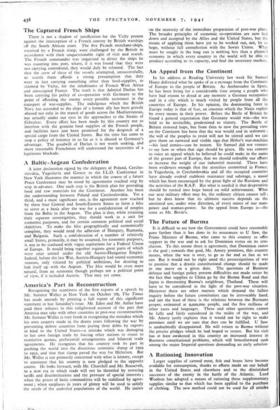America's Part in Reconstruction
Recognising the scantiness of the first reports of a speech by Mr. Sumner Welles in New York on October 7th, The Times has made amends by printing a full report of this significant statement in last Saturday's issue. Mr. Eden and Mr. Attlee have paid their tributes to this enlightened account of the part that America may take with other countries in post-war reconstruction. Mr. Sumner Welles is very frank in recognising the mistakes which his own country made in the dozen years following the war by preventing debtor countries from paying their debts by exports in kind to the United States—a mistake which was damaging to her own foreign trade by forcing other nations to resort to restrictive quotas, preferential arrangements and bilateral trade agreements. He recognises that his country took its part in pushing the world into the disastrous economic slump of 1929 to 1931, and that that slump paved the way for Hitlerism. But Mr. Welles is not primarily concerned with what is history, except to announce that his country is now pledged to the opposite course. He looks forward, with Mr. Churchill and Mr. Roosevelt, to a new era in which trade will not be throttled by towering tariffs and discriminations and the pressure of special interests ; when the prices of basic commodities will be stabilised by agree- ment ; when surpluses in years of plenty will be used to satisfy the needs of the underfed populations of the world. He insists
on the necessity of the immediate preparation of post-war plans. The broader principles of economic co-operation are now laid down and accepted by the Allies and the United States, but the means of applying them have yet to be worked out, not, let us hope, without full consultation with the Soviet Union. What must be sought in the long run is nothing less than a planned economy in which every country in the world will be able to produce according to its capacity, and find the necessary markets.






















 Previous page
Previous page